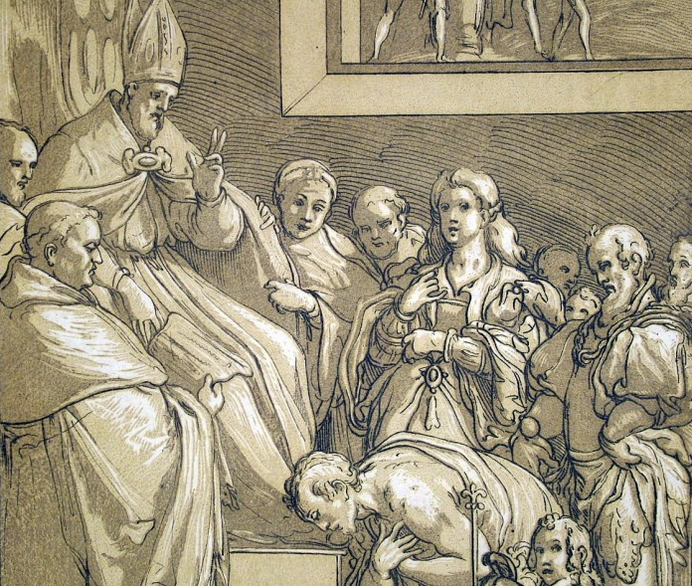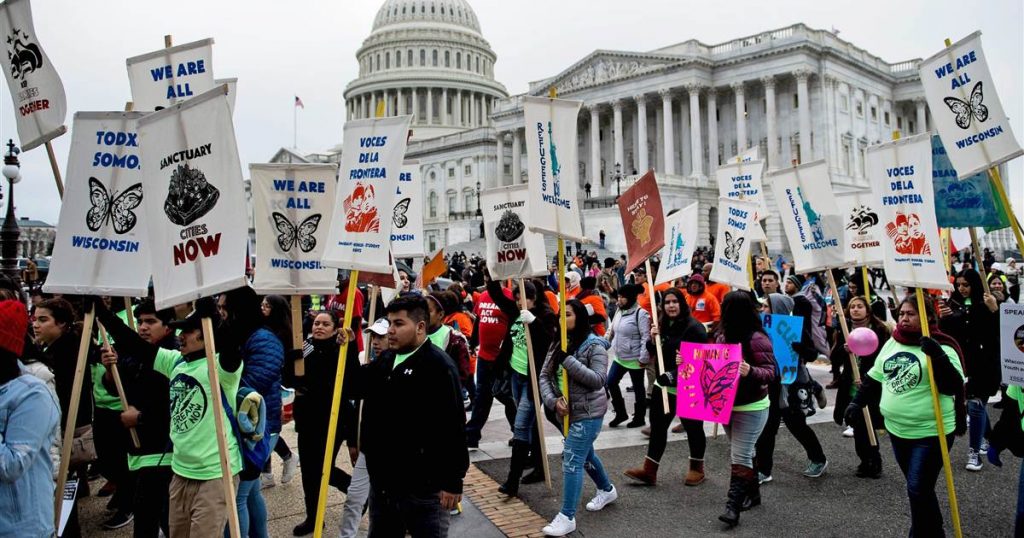Editor’s Note: The following comprises the tenth chapter of The Holy Roman Empire, by James Bryce (published 1871). All spelling in the original.
(Continued from Part 9)
CHAPTER X
THE STRUGGLE OF THE EMPIRE AND THE PAPACY
Reformed by the Emperors and their Teutonic nominees, the Papacy had resumed in the middle of the eleventh century the schemes of polity shadowed forth by Nicholas I, and which the degradation of the last age had only suspended. Under the guidance of her greatest mind, Hildebrand, the archdeacon of Rome, she now advanced to their completion, and proclaimed that war of the ecclesiastical power against the civil power in the person of the Emperor, which became the centre of the subsequent history of both. While the nature of the struggle cannot be understood without a glance at their previous connection, the vastness of the subject warns one from the attempt to draw even its outlines, and restricts our view to those relations of Popedom and Empire which arise directly out of their respective positions as heads spiritual and temporal of the universal Christian state.
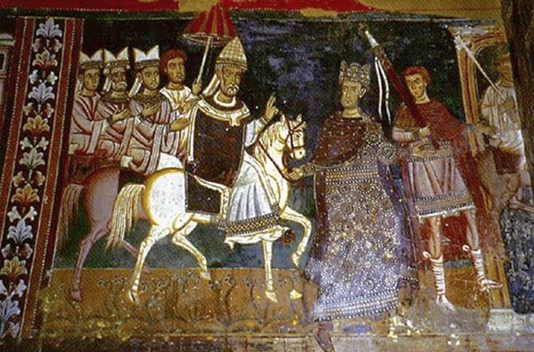
Growth of the Papal power
The eagerness of Christianity in the age immediately following her political establishment to purchase by submission the support of the civil power, has been already remarked. The change from independence to supremacy was gradual. The tale we smile at, how Constantine, healed of his leprosy, granted the West to bishop Sylvester, and retired to Byzantium that no secular prince might interfere with the jurisdiction or profane the neighbourhood of Peter’s chair, worked great effects through the belief it commanded for many centuries. Nay more, its groundwork was true. It was the removal of the seat of government from the Tiber to the Bosphorus that made the Pope the greatest personage in the city, and in the prostration after Alaric’s invasion he was seen to be so. Henceforth he alone was a permanent and effective, though still unacknowledged power, as truly superior to the revived senate and consuls of the phantom republic as Augustus and Tiberius had been to the faint continuance of their earlier prototypes. Pope Leo the First asserted the universal jurisdiction of his see, and his persevering successors slowly enthralled Italy, Illyricum, Gaul, Spain, Africa, dexterously confounding their undoubted metropolitan and patriarchal rights with those of œcumenical bishop, in which they were finally merged. By his writings and the fame of his personal sanctity, by the conversion of England and the introduction of an impressive ritual, Gregory the Great did more than any other pontiff to advance Rome’s ecclesiastical authority. Yet his tone to Maurice of Constantinople was deferential, to Phocas adulatory; his successors were not consecrated till confirmed by the Emperor or the Exarch; one of them was dragged in chains to the Bosphorus, and banished thence to Scythia. When the iconoclastic controversy and the intervention of Pipin broke the allegiance of the Popes to the East, the Franks, as patricians and Emperors, seemed to step into the position which Byzantium had lost. At Charles’s coronation, says the Saxon poet,

Relations of the Papacy and the Empire
Their relations were, however, no longer the same. If the Frank vaunted conquest, the priest spoke only of free gift. What Christendom saw was that Charles was crowned by the Pope’s hands, and undertook as his principal duty the protection and advancement of the Holy Roman Church. The circumstances of Otto the Great’s coronation gave an even more favourable opening to sacerdotal claims, for it was a Pope who summoned him to Rome and a Pope who received from him an oath of fidelity and aid. In the conflict of three powers, the Emperor, the pontiff, and the people—represented by their senate and consuls, or by the demagogue of the hour—the most steady, prudent, and far-sighted was sure eventually to prevail. The Popedom had no minorities, as yet few disputed successions, few revolts within its own army—the host of churchmen through Europe. Boniface’s conversion of Germany under its direct sanction, gave it a hold on the rising hierarchy of the greatest European state; the extension of the rule of Charles and Otto diffused in the same measure its emissaries and pretensions. The first disputes turned on the right of the prince to confirm the elected pontiff, which was afterwards supposed to have been granted by Hadrian I to Charles, in the decree quoted as ‘Hadrianus Papa.’ This ‘ius eligendi et ordinandi summum pontificem,’ which Lewis I appears as yielding by the ‘Ego Ludovicus,’ was claimed by the Carolingians whenever they felt themselves strong enough, and having fallen into desuetude in the troublous times of the Italian Emperors, was formally renewed to Otto the Great by his nominee Leo VIII. We have seen it used, and used in the purest spirit, by Otto himself, by his grandson Otto III, last of all, and most despotically, by Henry III. Along with it there had grown up a bold counter-assumption of the Papal chair to be itself the source of the imperial dignity. In submitting to a fresh coronation, Lewis the Pious admitted the invalidity of his former self-performed one: Charles the Bald did not scout the arrogant declaration of John VIII, that to him alone the Emperor owed his crown; and the council of Pavia, when it chose him king of Italy, repeated the assertion. Subsequent Popes knew better than to apply to the chiefs of Saxon and Franconian chivalry language which the feeble Neustrian had not resented; but the precedent remained, the weapon was only hid behind the pontifical robe to be flashed out with effect when the moment should come.
Temporal power of the Popes
There were also two other great steps which papal power had taken. By the invention and adoption of the False Decretals it had provided itself with a legal system suited to any emergency, and which gave it unlimited authority through the Christian world in causes spiritual and over persons ecclesiastical. Canonistical ingenuity found it easy in one way or another to make this include all causes and persons whatsoever: for crime is always and wrong is often sin, nor can aught be anywhere done which may not affect the clergy. On the gift of Pipin and Charles, repeated and confirmed by Lewis I, Charles II, Otto I and III, and now made to rest on the more venerable authority of the first Christian Emperor, it could found claims to the sovereignty of Rome, Tuscany, and all else that had belonged to the exarchate. Indefinite in their terms, these grants were never meant by the donors to convey full dominion over the districts—that belonged to the head of the Empire—but only as in the case of other church estates, a perpetual usufruct or dominium utile. They were, in fact, mere endowments. Nor had the gifts been ever actually reduced into possession: the Pope had been hitherto the victim, not the lord, of the neighbouring barons. They were not, however, denied, and might be made a formidable engine of attack: appealing to them, the Pope could brand his opponents as unjust and impious; and could summon nobles and cities to defend him as their liege lord, just as, with no better original right, he invoked the help of the Norman conquerors of Naples and Sicily.
The attitude of the Roman Church to the imperial power at Henry the Third’s death was externally respectful. The right of a German king to the crown of the city was undoubted, and the Pope was his lawful subject. Hitherto the initiative in reform had come from the civil magistrate. But the secret of the pontiff’s strength lay in this: he, and he alone, could confer the crown, and had therefore the right of imposing conditions on its recipient. Frequent interregna had weakened the claim of the Transalpine monarch and prevented his power from taking firm root; his title was never by law hereditary: the holy Church had before sought and might again seek a defender elsewhere. And since the need of such defence had originated this transference of the Empire from the Greeks to the Franks, since to render it was the Emperor’s chief function, it was surely the Pope’s duty as well as his right to see that the candidate was capable of fulfilling his task, to degrade him if he rejected or misperformed it.
Hildebrandine reforms
The first step was to remove a blemish in the constitution of the Church, by fixing a regular body to choose the supreme pontiff. This Nicholas II did in A.D. 1059, feebly reserving the rights of Henry IV and his successors. Then the reforming spirit, kindled by the abuses and depravity of the last century, advanced apace. It had two main objects: the enforcement of celibacy, especially on the secular clergy, who enjoyed in this respect considerable freedom, and the extinction of simony. In the former, the Emperors and a large part of the laity were not unwilling to join: the latter no one dared to defend in theory. But when Gregory VII declared that it was sin for the ecclesiastic to receive his benefice under conditions from a layman, and so condemned the whole system of feudal investitures to the clergy, he aimed a deadly blow at all secular authority. Half of the land and wealth of Germany was in the hands of bishops and abbots, who would now be freed from the monarch’s control to pass under that of the Pope. In such a state of things government itself would be impossible.
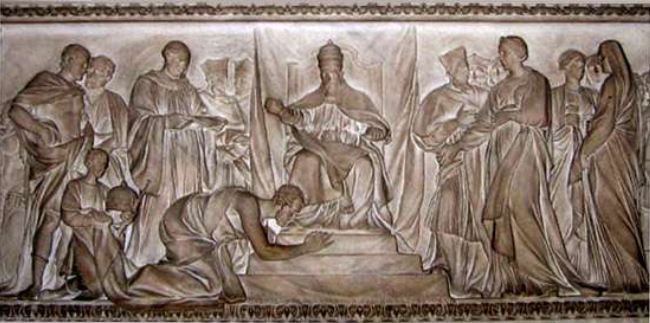
Henry IV and Gregory VII, A.D. 1077
Henry and Gregory already mistrusted each other: after this decree war was inevitable. The Pope cited his opponent to appear and be judged at Rome for his vices and misgovernment. The Emperor replied by convoking a synod, which deposed and insulted Gregory. At once the dauntless monk pronounced Henry excommunicate, and fixed a day on which, if still unrepentant, he should cease to reign. Supported by his own princes, the monarch might have defied a mandate backed by no external force; but the Saxons, never contented since the first place had passed from their own dukes to the Franconians, only waited the signal to burst into a new revolt, whilst through all Germany the Emperor’s tyranny and irregularities of life had sown the seeds of disaffection. Shunned, betrayed, threatened, he rushed into what seemed the only course left, and Canosa saw Europe’s mightiest prince, titular lord of the world, a suppliant before the successor of the Apostle. Henry soon found that his humiliation had not served him; driven back into opposition, he defied Gregory anew, set up an anti-pope, overthrew the rival whom his rebellious subjects had raised, and maintained to the end of his sad and chequered life a power often depressed but never destroyed. Nevertheless had all other humiliation been spared, that one scene in the yard of the Countess Matilda’s castle, an imperial penitent standing barefoot and woollen-frocked on the snow three days and nights, till the priest who sat within should admit and absolve him, was enough to mark a decisive change, and inflict an irretrievable disgrace on the crown so abased. Its wearer could no more, with the same lofty confidence, claim to be the highest power on earth, created by and answerable to God alone. Gregory had extorted the recognition of that absolute superiority of the spiritual dominion which he was wont to assert so sternly; proclaiming that to the Pope, as God’s vicar, all mankind are subject, and all rulers responsible: so that he, the giver of the crown, may also excommunicate and depose. Writing to William the Conqueror, he says: ‘For as for the beauty of this world, that it may be at different seasons perceived by fleshly eyes, God hath disposed the sun and the moon, lights that outshine all others; so lest the creature whom His goodness hath formed after His own image in this world should be drawn astray into fatal dangers, He hath provided in the apostolic and royal dignities the means of ruling it through divers offices…. If I, therefore, am to answer for thee on the dreadful day of judgment before the just Judge who cannot lie, the creator of every creature, bethink thee whether I must not very diligently provide for thy salvation, and whether, for thine own safety, thou oughtest not without delay to obey me, that so thou mayest possess the land of the living.’
Gregory was not the inventor nor the first propounder of these doctrines; they had been long before a part of mediæval Christianity, interwoven with its most vital doctrines. But he was the first who dared to apply them to the world as he found it. His was that rarest and grandest of gifts, an intellectual courage and power of imaginative belief which, when it has convinced itself of aught, accepts it fully with all its consequences, and shrinks not from acting at once upon it. A perilous gift, as the melancholy end of his own career proved, for men were found less ready than he had thought them to follow out with unswerving consistency like his the principles which all acknowledged. But it was the very suddenness and boldness of his policy that secured the ultimate triumph of his cause, awing men’s minds and making that seem realized which had been till then a vague theory. His premises once admitted,—and no one dreamt of denying them,—the reasonings by which he established the superiority of spiritual to temporal jurisdiction were unassailable. With his authority, in whose hands are the keys of heaven and hell, whose word can bestow eternal bliss or plunge in everlasting misery, no other earthly authority can compete or interfere: if his power extends into the infinite, how much more must he be supreme over things finite? It was thus that Gregory and his successors were wont to argue: the wonder is, not that they were obeyed, but that they were not obeyed more implicitly. In the second sentence of excommunication which Gregory passed upon Henry the Fourth are these words:—
‘Come now, I beseech you, O most holy and blessed Fathers and Princes, Peter and Paul, that all the world may understand and know that if ye are able to bind and to loose in heaven, ye are likewise able on earth, according to the merits of each man, to give and to take away empires, kingdoms, princedoms, marquisates, duchies, countships, and the possessions of all men. For if ye judge spiritual things, what must we believe to be your power over worldly things? And if ye judge the angels who rule over all proud princes, what can ye not do to their slaves?’
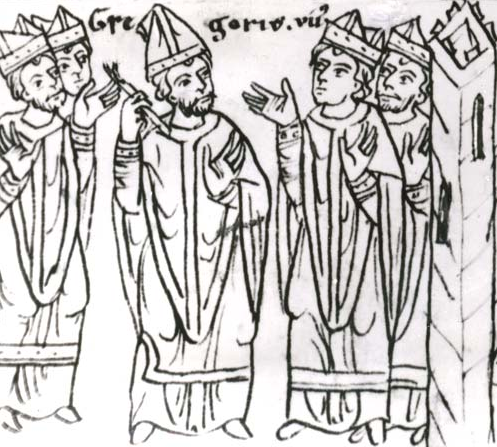
Results of the struggle
Doctrines such as these do indeed strike equally at all temporal governments, nor were the Innocents and Bonifaces of later days slow to apply them so. On the Empire, however, the blow fell first and heaviest. As when Alaric entered Rome, the spell of ages was broken, Christendom saw her greatest and most venerable institution dishonoured and helpless; allegiance was no longer undivided, for who could presume to fix in each case the limits of the civil and ecclesiastical jurisdictions? The potentates of Europe beheld in the Papacy a force which, if dangerous to themselves, could be made to repel the pretensions and baffle the designs of the strongest and haughtiest among them. Italy learned how to meet the Teutonic conqueror by gaining the papal sanction for the leagues of her cities. The German princes, anxious to narrow the prerogative of their head, were the natural allies of his enemy, whose spiritual thunders, more terrible than their own lances, could enable them to depose an aspiring monarch, or extort from him any concessions they desired. Their altered tone is marked by the promise they required from Rudolf of Swabia, whom they set up as a rival to Henry, that he would not endeavour to make the throne hereditary.
It is not possible here to dwell on the details of the great struggle of the Investitures, rich as it is in the interest of adventure and character, momentous as were its results for the future. A word or two must suffice to describe the conclusion, not indeed of the whole drama, which was to extend over centuries, but of what may be called its first act. Even that act lasted beyond the lives of the original performers. Gregory the Seventh passed away at Salerno in A.D. 1087, exclaiming with his last breath ‘I have loved justice and hated iniquity, therefore I die in exile.’ Nineteen years later, in A.D. 1106, Henry IV died, dethroned by an unnatural son whom the hatred of a relentless pontiff had raised in rebellion against him. But that son, the emperor Henry the Fifth, so far from conceding the points in dispute, proved an antagonist more ruthless and not less able than his father. He claimed for his crown all the rights over ecclesiastics that his predecessors had ever enjoyed, and when at his coronation in Rome, A.D. 1112, Pope Paschal II refused to complete the rite until he should have yielded, Henry seized both Pope and cardinals and compelled them by a rigorous imprisonment to consent to a treaty which he dictated.
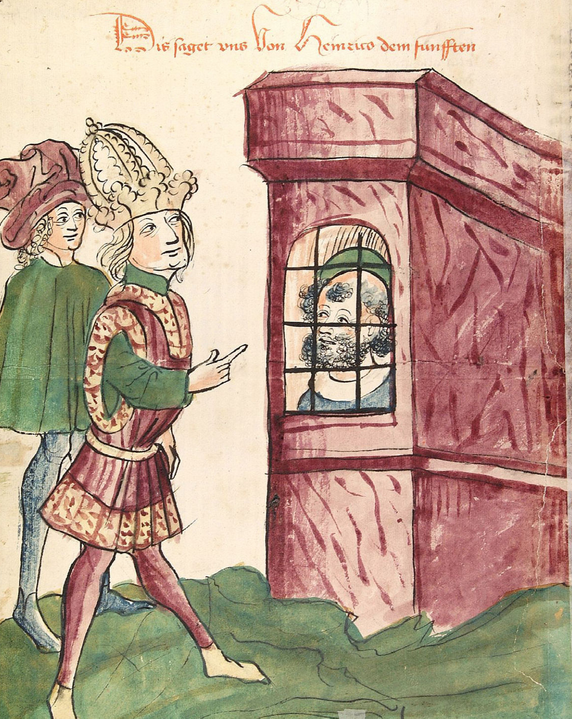
Concordat of Worms, A.D. 1122
Once set free, the Pope, as was natural, disavowed his extorted concessions, and the struggle was protracted for ten years longer, until nearly half a century had elapsed from the first quarrel between Gregory VII and Henry IV. The Concordat of Worms, concluded in A.D. 1122, was in form a compromise, designed to spare either party the humiliation of defeat. Yet the Papacy remained master of the field. The Emperor retained but one-half of those rights of investiture which had formerly been his. He could never resume the position of Henry III; his wishes or intrigues might influence the proceedings of a chapter, his oath bound him from open interference. He had entered the strife in the fulness of dignity; he came out of it with tarnished glory and shattered power. His wars had been hitherto carried on with foreign foes, or at worst with a single rebel noble; now his steadiest ally was turned into his fiercest assailant, and had enlisted against him half his court, half the magnates of his realm. At any moment his sceptre might be shivered in his hand by the bolt of anathema, and a host of enemies spring up from every convent and cathedral.
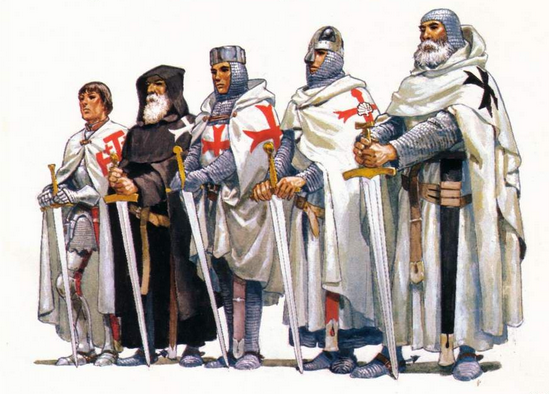
The Crusades
Two other results of this great conflict ought not to pass unnoticed. The Emperor was alienated from the Church at the most unfortunate of all moments, the era of the Crusades. To conduct a great religious war against the enemies of the faith, to head the church militant in her carnal as the Popes were accustomed to do in her spiritual strife, this was the very purpose for which an Emperor had been called into being; and it was indeed in these wars, more particularly in the first three of them, that the ideal of a Christian commonwealth which the theory of the mediæval Empire proclaimed, was once for all and never again realized by the combined action of the great nations of Europe. Had such an opportunity fallen to the lot of Henry III, he might have used it to win back a supremacy hardly inferior to that which had belonged to the first Carolingians. But Henry IV’s proscription excluded him from all share in an enterprise which he must otherwise have led—nay, more, committed it to the guidance of his foes. The religious feeling which the Crusades evoked—a feeling which became the origin of the great orders of chivalry, and somewhat later of the two great orders of mendicant friars—turned wholly against the opponent of ecclesiastical claims, and was made to work the will of the Holy See, which had blessed and organized the project. A century and a half later the Pope did not scruple to preach a crusade against the Emperor himself.
Again: it was now that the first seeds were sown of that fear and hatred wherewith the German people never thenceforth ceased to regard the encroaching Romish court. Branded by the Church and forsaken by the nobles, Henry IV retained the affections of the faithful burghers of Worms and Liege. It soon became the test of Teutonic patriotism to resist Italian priestcraft.
Limitations of imperial prerogative
The changes in the internal constitution of Germany which the long anarchy of Henry IV’s reign had produced are seen when the nature of the prerogative as it stood at the accession of Conrad II, the first Franconian Emperor, is compared with its state at Henry V’s death. All fiefs are now hereditary, and when vacant can be granted afresh only by consent of the States; the jurisdiction of the crown is less wide; the idea is beginning to make progress that the most essential part of the Empire is not its supreme head but the commonwealth of princes and barons.
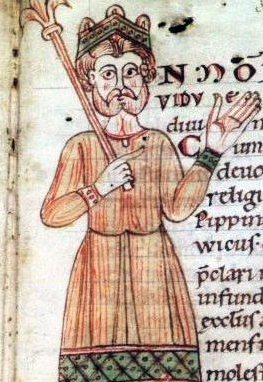
Lothar II, 1125-1138
The greatest triumph of these feudal magnates is in the establishment of the elective principle, which when confirmed by the three free elections of Lothar II, Conrad III, and Frederick I, passes into an undoubted law. The Prince-Electors are mentioned in A.D. 1156 as a distinct and important body. The clergy, too, whom the policy of Otto the Great and Henry II had raised, are now not less dangerous than the dukes, whose power it was hoped they would balance; possibly more so, since protected by their sacred character and their allegiance to the Pope, while able at the same time to command the arms of their countless vassals. Nor were the two succeeding Emperors the men to retrieve those disasters. The Saxon Lothar the Second is the willing minion of the Pope; performs at his coronation a menial service unknown before, and takes a more stringent oath to defend the Holy See, that he may purchase its support against the Swabian faction in his own dominions.
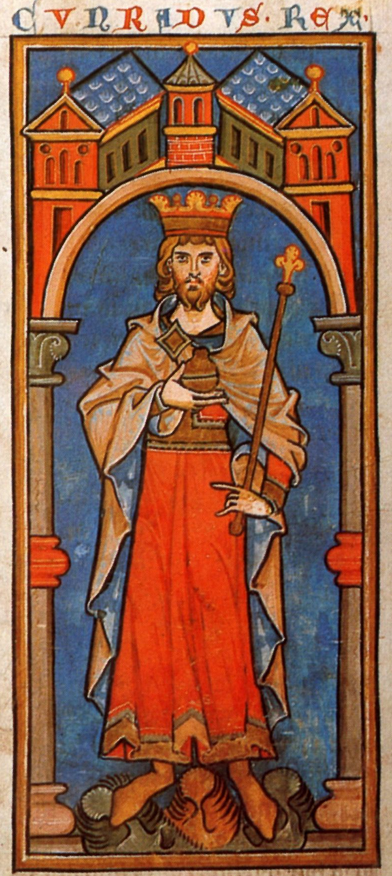
Conrad III, 1138-1152
Conrad the Third, the first Emperor of the great house of Hohenstaufen, represents the anti-papal party; but domestic troubles and an unfortunate crusade prevented him from effecting anything in Italy. He never even entered Rome to receive the crown.

